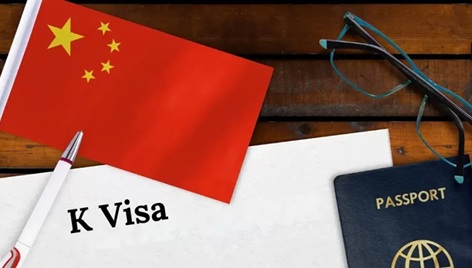(Prelims: Current Events)
(Mains GS Paper 2: Impact of policies and politics of developed and developing countries on India's interests; Indian diaspora) |
Context
While the US has increased its H-1B visa fee to nearly $100,000, China has announced the 'K visa' to attract international science and technology professionals. This visa, effective from October 1, aims to integrate global young talents into China's research and innovation system.

About the K Visa
- The K visa is a new visa category introduced by China, specifically for young professionals in the fields of Science, Technology, Engineering, and Mathematics (STEM).
- Its key feature is that it does not require an invitation from a Chinese company or organization.
Key Features of the K Visa
- Multiple Entry: Visa holders can enter and leave China multiple times.
- Extended Stay: Allows for a longer stay period compared to other visas.
- No Invitation Required: No prior approval from a Chinese employer is needed.
- Freedom of Activities: Visa holders can engage in activities such as education, research, business, cultural exchange, and startups.
Benefits of the K Visa
- Attracting Global Talent: It will encourage qualified scientists and technology professionals from around the world to come to China.
- Boosting Research and Innovation: Youth participation will strengthen China's R&D system.
- International Collaboration: It will facilitate seamless partnerships between scientists from different countries.
- Opportunities for Startups and Entrepreneurship: It will give a new impetus to innovation and entrepreneurship.
Implications
- China's Enhanced Global Competitiveness: This move, in contrast to US visa policies, will strengthen China's position in the global talent race.
- Growing Number of Migrant Professionals: Over 38 million foreign travel entries were already recorded in the first half of 2025.
- Strengthening an innovation-driven economy: The Talent Power Strategy will accelerate technological development.
H-1B Visa Alternatives
- The H-1B visa remains crucial for the US tech industry, especially for Indians (71% of H-1B visas are held by Indians).
- However, the K visa could emerge as a new and attractive option for those frustrated with the limitations and rising costs of the H-1B.
- China could emerge as an attractive alternative market, particularly for early-career professionals.
Challenges for India
- Risk of brain drain: India's skilled STEM professionals may be attracted to China.
- Loss of competitiveness: If India doesn't provide opportunities for young scientists, talent will move elsewhere.
- Lack of policy and opportunities: India currently lacks a comprehensive, talent-friendly visa model.
- Future partnerships could be affected if China attracts a large number of Indian professionals.
Way Forward
- India needs a robust visa policy to attract foreign talent and retain its own.
- Reforms in higher education, research, and the startup ecosystem are essential to make India a top destination for global talent.
- Policy flexibility and schemes that promote innovation are crucial.
- India should develop its roadmap after a thorough analysis of policies in both the US and China.

 Contact Us
Contact Us  New Batch : 9555124124/ 7428085757
New Batch : 9555124124/ 7428085757  Tech Support : 9555124124/ 7428085757
Tech Support : 9555124124/ 7428085757








